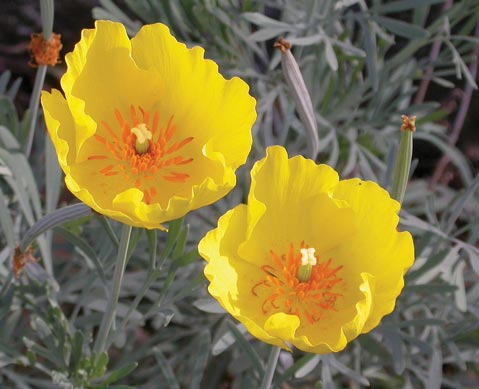Golden State
Plants to Make Your Late-Summer Garden Glow

Fall is just around the corner, even here on the sunny Southern California coast. In many parts of the country, that means that trees and shrubs are beginning to lose their vibrant green and transition to the fiery and golden hues of autumn. In California, there are a few deciduous species that can add to the glow of late summer and fall, and the grassy hills have definitely already given up their spring verdancy. The state motto is, after all, “California: Keep It Green and Golden.”
For gardeners seeking this rich hue, grasses and ginkgoes can lend their glimmer, but flowers and evergreen foliage that reliably sport the rich yellow shade may also be needed. For golden flowers, there are perennials such as golden cup poppies (Hunnemannia fumariifolia), golden garlic (Allium moly), golden globes (Lysimachia congestiflora), the golden marguerite (Anthemis tinctoria), and the golden-eyed grass (not really a grass, but an iris relative, Sisyrinchium californicum). There are also larger subjects, such as the flowering trees: the goldenrain tree (Koelreuteria paniculata), golden shower (Cassia fistula), and gold medallion tree (another Cassia, C. leptophylla). The list goes on.
When plants have golden leaves in the fall, it means that the green photosynthetic pigments, chlorophyll a and b, are being dismantled chemically and the accessory pigments that reflect light in the longer, yellower wavelengths are more in evidence. Some plants have less green pigments year-round. They appear golden even though they don’t lose their leaves in fall. Some handsome and useful garden subjects are conifers. Junipers like Juniperus horizontalis ‘Mother Lode’ (get it?) and J. chinensis ‘Aurea’ have the desired sunny color. There are decidedly un-green cedars such as the Deodar cedar cultivar ‘Aurea’, a few golden selections of the Port Orford cedar (Chamaecyparis lawsoniana) and the American arborvitae (Thuja occidentalis ‘Golden Globe’, ‘Lutea’, and ‘Rheingold’).
Shrubs such as the ‘Sunset Gold’ cultivar of the pink breath of heaven (Coleonema pulchellum) are capable of brightening the garden with their brilliant pigments. There is a golden elderberry (Sambucus racemosa ‘Sutherland Gold’), and several selections of the versatile Spirea japonica and Coprosma repens, that will brighten any garden. Licorice plant (Helichrysum petiolare ‘Limelight’) is striking, as is golden feverfew (Tanacetum parthenium ‘Aureum’).
There are grasses and grass look-alikes that can punctuate the mixed border or stop traffic at curbside. Golden millet grass (Milium efusum) and a stunningly variegated maiden grass (Miscanthus sinensis ‘Gold Bar’) are true grasses. Japanese sweet flag (Acorus gramineus) is another iris relative and comes in a variety of shades, including one called ‘Ogon’ that is heavenly gold. The giant grasses, or bamboos, can display deeply golden stems, too. Phyllostachys aurea has the tell-tale Latin word in its name.
The succulent world also has some bright subjects. Most obvious is the golden barrel cactus (Echinocactus grusonii), whose rounded stems are entirely clothed in shiny, golden spines. For a golden carpet, there is the fine gold leaf sedum, and there is even a fuzzy kalanchoe (Kalanchoe tomentosa ‘Golden Girl’), which glows.
Gardeners in the gloomier parts of the Western world, like England and the Pacific Northwest, have embraced this type of plant to shine a light into an otherwise dark garden. Perhaps Southern California gardeners can learn a valuable lesson from them.
September Tips
• Plant South African bulbs, such as freesia, ixia, watsonia, the species gladiolus, and sparaxis.
• Fruit trees, and even vines like wisteria, may put out suckers that should be cut close to the trunk or pulled off to keep energy going into the main growth.
• Harvest potatoes, onions, and garlic only after their foliage has fallen over and dried out.
• Because everything is growing so rapidly, there is plenty of material to add to the compost heap. Start a new pile, and turn the earliest pile once more and let it finish off.



